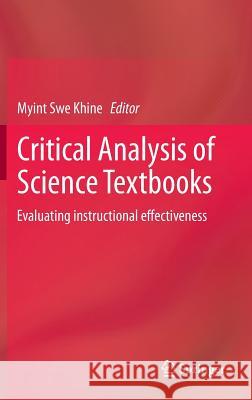Critical Analysis of Science Textbooks: Evaluating Instructional Effectiveness » książka
Critical Analysis of Science Textbooks: Evaluating Instructional Effectiveness
ISBN-13: 9789400741676 / Angielski / Twarda / 2013 / 312 str.
The critical analysis of science textbooks is vital in improving teaching and learning at all levels in the subject, and this volume sets out a range of academic perspectives on how that analysis should be done. Each chapter focuses on an aspect of science textbook appraisal, with coverage of everything from theoretical and philosophical underpinnings, methodological issues, and conceptual frameworks for critical analysis, to practical techniques for evaluation.Contributions from many of the most distinguished scholars in the field give this collection its sure-footed contemporary relevance, reflecting the international standards of UNESCO as well as leading research organizations such as the American Association for the Advancement of Science (whose Project 2061 is an influential waypoint in developing protocols for textbook analysis). Thus the book shows how to gauge aspects of textbooks such as their treatment of controversial issues, graphical depictions, scientific historiography, vocabulary usage, accuracy, and readability. The content also covers broader social themes such as the portrayal of women and minorities."Despite newer, more active pedagogies, textbooks continue to have a strong presence in classrooms and to embody students socio-historical inheritance in science. Despite their ubiquitous presence, they have received relatively little on-going empirical study. It is imperative that we understand how textbooks influence science learning. This book presents a welcome and much needed analysis."Tina A. Grotzer
Harvard University, Cambridge, Massachusetts, USAThe present book provides a much needed survey of the current state of research into science textbooks, and offers a wide range of perspectives to inform the 'science' of writing better science textbooks. Keith S Taber
University of Cambridge, Cambridge, United Kingdom"











